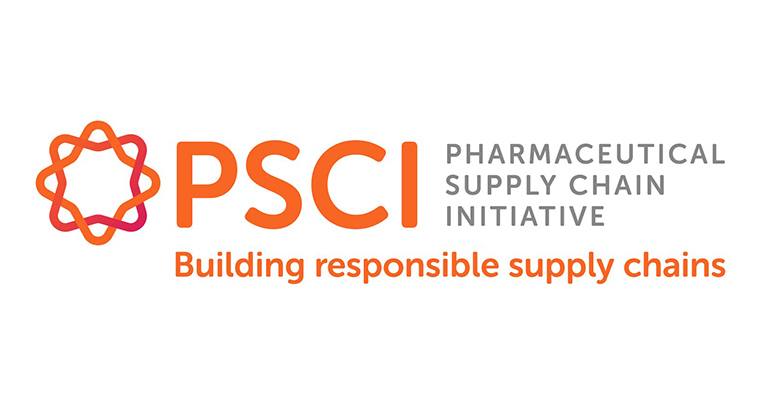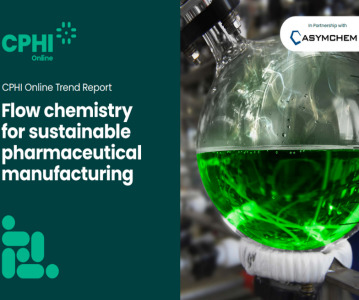Ensuring a healthy supply chain throughout the COVID-19 crisis

The first in a quarterly series of blog posts about responsible supply chain management from the PSCI Chair, Caroline O'Brien
Covid-19 has presented an unprecedented challenge, and not least to the supply chains that fuel so many aspects of our lives. Ensuring uninterrupted access to quality medicines, around the world, has been the immediate focus of our industry as we navigate this strange time. However, as we adjust to the ‘new normal’ (or new abnormal?), I have the opportunity to reflect on what this pandemic has taught us about the responsibility of businesses, and our ability to ride out such crises.
My role as Global Quality Audit Director for the AsiaPac region – for which I’m currently based in Osaka, Japan – has given me quite a vantage point during the pandemic (it’s also kept me far from my family and very reliant on video calls – but that’s another story). We are no longer able to rely on physically travelling to our suppliers and company sites to audit, and we along with regulators and our peer companies have had to adapt and consider novel and innovative ways to achieve the oversight that our audits require. For Pharmaceutical Supply Chain Initiative (PSCI) members who carry out audits, the auditing programme has, like responsible supply chain management as a whole, two over-arching goals. First, to improve the health, safety, environmental, and wider societal outcomes of the manufacturing and buying process; and second, to improve business resilience by reducing risk and building preparedness. For many pharmaceutical companies, the supplier network is vast with a mix of direct and indirect suppliers (tier 1, tier 2 and beyond). Even amongst the most sophisticated companies, transparency across tier 2 and 3 and suppliers is a challenge.

"Whilst other sectors might send workers home or halt production, manufacturing medicines can’t be done outside of specialist facilities, so we are compelled to find safe and healthy ways to operate"
This crisis has tested corporate approaches to supply chain management, underscoring the importance of the practices often grouped under the heading ‘responsible business’. Whether it’s the provision of effective personal protective equipment (PPE), education around personal hygiene and safety, respect for worker rights and the environment - a commitment to standards are part of our societal responsibility and also a foundation for surviving external threats to the supply chain that provides us, all of us, with access to medicines vital to our wellbeing. Whilst other sectors might send workers home or halt production, manufacturing medicines can’t be done outside of specialist facilities, so we are compelled to find safe and healthy ways to operate.
In many ways, my role as Chair of the PSCI – a non-profit collaboration between over 40 pharmaceutical and healthcare companies to advance responsible supply chain practices – places me in a privileged position, in being able to observe how my peers are responding to these challenges. It’s been fantastic to witness the active good practice sharing between our member companies. For example, we recently shared with our membership the guidance that Novartis has provided to its suppliers in response to Covid-19, giving detailed instructions and advice on a range of topics from distancing and safety to labour rights.
Fundamental corporate responsibilities, such as preserving the environment and human rights, cannot be sacrificed because businesses are operating in ‘crisis mode’. Taking labour rights specifically, it’s my hope that the sector will support the workers that manufacture and package our products – including those who work for us indirectly through third parties – with the same consideration with which we support the decision-makers working directly for us in offices. This might mean enhancing paid sick leave and adding flexibility on proof of sickness, allowing workers to take time off to support their loved ones, enabling hygiene and distancing within dormitories and other provided accommodation, and supporting migrant workers - for example by continuing their employment even when they’re unable to work, and if they do wish to return home then ensuring they have access to the documents and financial support they need to make that journey without harm to themselves or others.
"Fundamental corporate responsibilities, such as preserving the environment and human rights, cannot be sacrificed because businesses are operating in ‘crisis mode’"
At PSCI we face similar operational challenges to many others. Nevertheless, we have been realizing opportunities to accelerate the digitalization of our community and resources. In particular, we’re pleased to have launched our online community platform for suppliers last month: ‘The Link for Suppliers’ enables consultation and dialogue on responsible supply chain issues and makes it even easier for suppliers to share audits and access our capability building resources. I’m really looking forward to seeing The Link grow and develop. Also this month we brought over 140 members together for our first fully virtual member meeting, notably with guest presentation from Sir David King, formerly the UK Government’s Chief Scientific Advisor advising on the Foot and Mouth epidemic, who commented on that other public health crisis – climate change – and the need to maintain the momentum we’ve gained on this issue.
So, all in all a time of unprecedented challenge but also an opportunity to support and drive progress, reaffirming and underscoring the vital role that business plays in society. There is much to be done!
Caroline O’Brien,
Global Quality Audit, AsiaPac Director, AstraZeneca and Chair, PSCI

About PSCI:
PSCI: Creating a better supply chain in the pharmaceutical and healthcare industry.
The Pharmaceutical Supply Chain Initiative (PSCI) is a group of pharmaceutical and healthcare companies who share a vision of better social, health, safety and environmental outcomes in the communities where we buy.
We believe that collectively PSCI members can share knowledge and expertise, across our industry, to drive complex, global change more effectively than any one organization alone.
We have joined forces to promote responsible supply chain management and better business conditions across the industry.

Related News
-
News CPHI Pharma Awards 2024: Meet the winners from the CPHI Celebration
This year we had a lot to celebrate, the 35th Anniversary of CPHI, and our esteemed award winners, of which we included two additional categories this year, the Future Leader award, and Woman of the Year award. -
News Women in Pharma: C-Suite Journeys in Leading Diversity
In this CPHI Milan special of our monthly series, we sit down with our panel of C-suite executives speaking on the ‘Leading with Diversity: The CEO Journey’ panel at this year’s show. -
News The BIOSECURE Act: implications for the pharma supply chain
On September 9, 2024, the US House of Representatives voted to pass the bill titled the BIOSECURE Act (the Act), which lists several Chinese companies in the pharmaceutical supply chain. The Act will prohibit American companies from contracting or doin... -
Sponsored Content CPHI Online Trend Report: How can flow chemistry help businesses achieve their sustainability goals?
In our latest CPHI Online Trend Report, we partner with Asymchem to understand the innovative potential of flow chemistry for API manufacturing, especially in regards to meeting sustainability goals. -
News CPHI Milan Speaker Spotlight: CDMO relations with Pharma and Start-Ups
In the run-up to CPHI Milan, we sit down with some of the experts and thought-leaders speaking at this year’s conferences. -
News Women in Pharma: Advocating for trans healthcare in pharma
In our monthly series on women in the pharmaceutical industry, we interview leading experts in the pharmaceutical supply and value chain to discuss the importance of gender diversity in healthcare, the workplace, and beyond. -
News A Day in the Life of a Vice President in R&D & Engineering
In the Day in the Life of Series, we've already had the chance to get to know a range of people in various roles in the pharma industry. In the latest interview we get a glimpse into the R&D side of things from Jennifer Sorrells, Vice Presiden... -
News CPHI Podcast Series: analysing supplier audits with the PSCI
This episode of the CPHI Podcast Series, hosted by Digital Editor Lucy Chard, goes through the results from the recent audits from the PSCI conducted on suppliers across the pharmaceutical industry, looking into ESG outcomes.
Position your company at the heart of the global Pharma industry with a CPHI Online membership
-
Your products and solutions visible to thousands of visitors within the largest Pharma marketplace
-
Generate high-quality, engaged leads for your business, all year round
-
Promote your business as the industry’s thought-leader by hosting your reports, brochures and videos within your profile
-
Your company’s profile boosted at all participating CPHI events
-
An easy-to-use platform with a detailed dashboard showing your leads and performance





.png)

